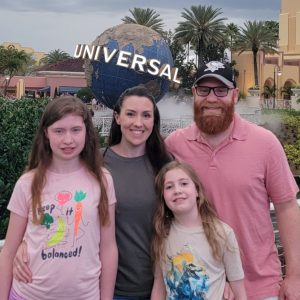I love running, but there are still many days I wonder why I punish myself by running non-stop for hours at a time. When I get discouraged or lose my motivation, I remember my daughters and how I want to be an example of not only a healthy lifestyle for them, but I want them to challenge themselves. That looks different for each of them as Lydia is a neurotypical, outgoing 10-year-old who has a heart the size of a large country while Charlotte is my introverted, amazing autistic 11-year-old.
Charlotte has so many uphill battles to fight in her daily life that come with her diagnosis. She loves to make people laugh but can struggle to find the right words to make a punchline hit right. She wants to try new things but a shaky sense of equilibrium and pronounced self-doubt can make many things feel impossible. She loves playing elaborate make-believe games with her little sister, but gets frustrated and overwhelmed if the game takes a turn she doesn’t expect. I am so proud when I see her push through her fears and limits. Each time she is able to do something new, it’s like watching the underdog win the gold medal. If she can push herself to strive for more every day of her life, why am I complaining about a measly few miles that I chose to run? Her and her sister are my inspiration every time I lace up and head out the door.
I have been raising money for Autism Connection of PA while I’ve been training for the Pittsburgh Marathon this time because I want parents like me to continue to have access to a community of caregivers and autistic individuals who can offer advice and support. I keep up with the newsletters and website to hear about sensory-friendly events in town and to be informed about current research into autism. I want to feel as equipped as possible to help Charlotte navigate a world that isn’t going to cut her any slack for a disability that (in her case) isn’t obvious upon first meeting her. I’ve been lucky enough to meet my fundraising goal through generous donations from businesses, family, and friends that recognize the importance of my mission. I can’t thank them enough! I’m constantly floored by how people respond so compassionately when I’ve shared our family’s story. Their support will enable many more autistic individuals and their families to know they have a place that offers comfort, information and community right in their own city.
After the race on May 1st, I may not be working toward an immediate fundraising goal, but I will always be promoting the mission of Autism Connection of PA. It’s been a great resource for my family and with support of generous donors, it can continue to make a huge impact in this community for a very long time.

Photo courtesy of Rachel Sivley






